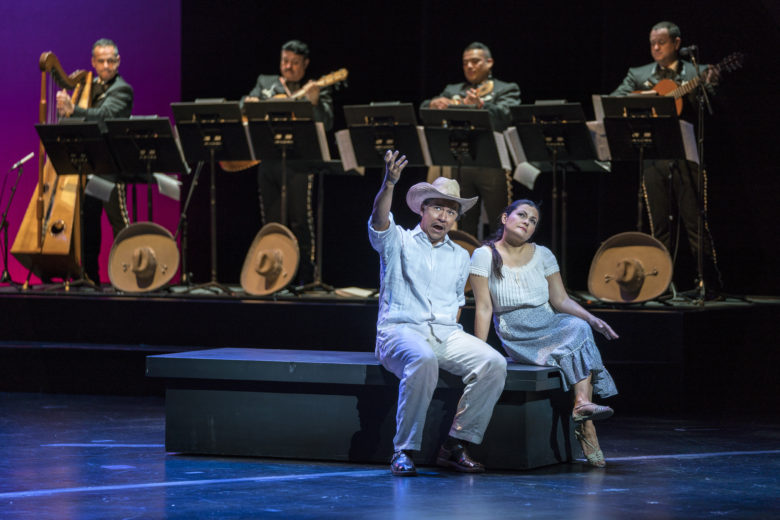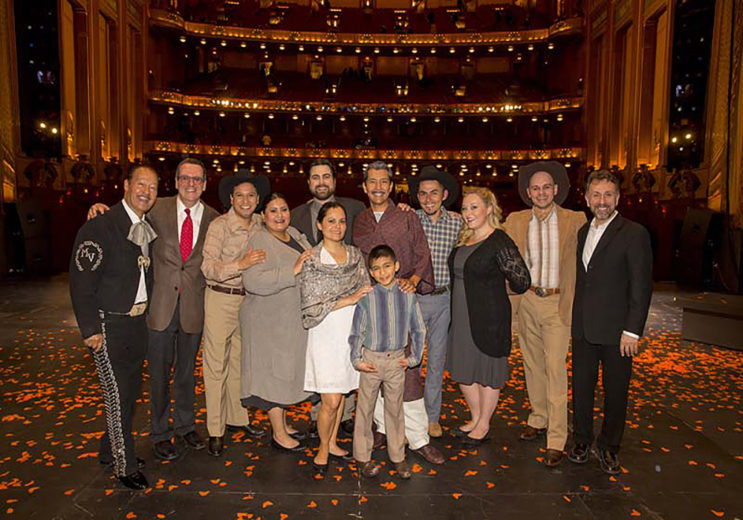
Cruzar La Cara De La Luna, produced by the Houston Grand Opera, is an opera that follows the life of Laurentino, who, upon his deathbed, reveals to his American-born son and granddaughter that he had a family in Mexico, years before he came to the United States. We then witness the tragedy of his love with Renata, and how a man-made border can destroy families with hopes and dreams who are forced to make dangerous choices just to stay together.
The uniqueness of the piece cannot be understated, as Cruzar is one of the first Spanish language operas being produced in America, and the first using mariachi music, performed by Mariachi Vargas, one of the oldest, continuously performing mariachi in the world, who play on stage, in full regalia. Like Hamilton did with the history of the American Revolution, Cruzar is popularizing opera for audiences who never previously saw themselves as being reflected in those stories.
‘LLERO had an opportunity to interview Leonard Foglia, Cruzar’s Librettist, discuss his involvement with the project, how his own immigrant history helped him relate to the immigration story of Latinos, and how the U.S. is ready for Latino-focused opera.
‘LL: Can you explain to us the role as Librettist, and what that means in opera?
LF: In this case I share the credit with Jose “Pepe” Martinez (the former musical director of Mariachi Vargas who passed away in 2016) with the lyrics, but in general the Librettist creates the story, creates the whole arc of it, and for this, I wrote all the scenes and I wrote the story, I invented the story and wrote most of the lyrics in the songs – it all comes down to words and music – I write the words and the composer writes the music.
‘LL: How did the idea of a “Mariachi Opera” come about, and how did you make sure that what you wrote would be authentic and fair to Latinos in terms of their music and representation on stage?
LF: When the former head of Houston Grand Opera first called me – he had just come from a Mariachi Vargas concert, and he said to me “What do you think of a Mariachi opera?” I had spent all those years in Mexico so I knew how emotional and story driven the music was, and I knew that was important. I asked what they wanted, and they said I could write about anything I wanted as long as it would have meaning and relevance to the Hispanic community in Texas.
My first notion was I’ll direct it, because if you want a story about Mexicans it should be written by a Mexican, but they were adamant because of other things I had written and I said, I’ll only collaborate with a Mexican because it has to be authentic, and I need somebody to make sure it’s true and authentic.
A lot of this is based on my father’s story. My father came over from Italy when he was 10 years old…he always felt displaced in this country. Once I started thinking about my father and my own upbringing, I realized that it was part of my story too and that I had a true and honest way into this story. And so I started playing with the notion of home.
There are three women that work in the costume department of Houston Grand Opera, a mother and two daughters. I sat down with them when I was first thinking about where I need to go with this story, and I said, “Where do you feel most at home?” I was stunned by their answer, they said “neither place.” They said “when we are here, we are American citizens, but we are not treated like American citizens, we are treated like foreigners. But when we go home to Guadalajara (they had just got back from a wedding) our Mexican relatives treat us like Americans, so we don’t feel at home anywhere.” And that’s when I knew this is what I wanted to write about – the sense of “where is home, is it where you are born, is it where you meet someone and get married and have children?

Leonard Foglia and cast of Cruzar La Cara De La Luna
